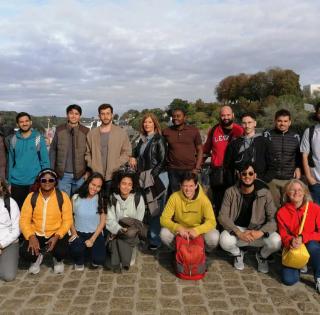
The Erasmus+ Charter and international strategy
ENSTA Bretagne has undertaken to respect the fundamental principles of the Erasmus+ Charter, stipulated in its international strategy.
Who is Erasmus+ for?
- Students enrolled at ENSTA Bretagne who wish to do a 3 to 12 month academic exchange in a European partner university;
- Students enrolled at ENSTA Bretagne doing a 2 to 12 month internship in a European country ;
- ENSTA Bretagne teaching staff, for teaching or training purposes of 2 years to 2 months, with a minimum of 8 hours of teaching per week for educational activities ;
- The administrative staff of ENSTA Bretagne for training purposes, for 2 days to 2 months maximum.
Institutional agreements
The institutional agreements enable study and teaching mobility between European higher education establishments. ENSTA Bretagne has more than 30 agreements in 10 different European countries.
ENSTA Bretagne has several bilateral agreements with universities situated in Europe.
Discover the list of our European partners
What are the selection criteria for the Erasmus+ program
What are the formalities?
How much is an Erasmus+ grant?
| Contry Group | Host Country | Monthly Rate for studies (2019/2020) | Monthly rate for Internship (2019/2020) |
|---|---|---|---|
| G1 | Denmark, Finland, Ireland, Iceland, Lichtenstein, Luxemburg, Norway, Sweden, the United Kingdom | 270 € - 370 € | 420 € - 520 € |
| G2 | Germany, Austria, Belgium, Cyprus, Spain, France, Greece, Italy, Malta, the Netherlands, Portugal | 220 € - 320 € | 370 € - 470 € |
| G3 | Republic of North Macedonia, Bulgaria, Croatia, Estonia, Hungary, Latvia, Lithuania, Poland, Czech Republic, Romania, Slovakia, Slovenia, Turkey, Serbia | 170 € - 270 € | 320 € - 420 € |
For teachers and staff, please consult the International hub.
Recognition of credits
In the case of mobility for studies, the student must obtain 30 ECTS credits to validate the semester and 60 ECTS credits to validate the year.
In the case of mobility for an internship, the student must obtain 6 ECTS credits for the second year internship and 30 ECTS credits for the Final Year Project (PFE) if the report is submitted on time and the viva voce is a success.
Mobility for people with disabilities
People with disabilities can obtain a special Erasmus+ grant, in addition to their mobility grant. This can cover the extra costs involved in a stay in Europe (up to 100% of the actual costs incurred).
Do not hesitate to contact the school’s Disabilities Officer, Ms Sylvie Guidal, or the Erasmus+ Coordinator directly for more information on the procedure.

Jointly financed by the Erasmus Program and the European Union




















